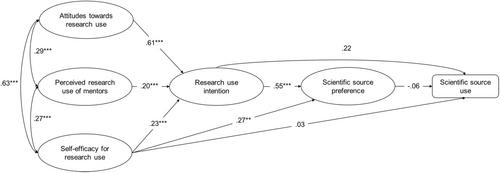Using the theory of planned behaviour to predict pre-service teachers' preferences for scientific sources
Abstract
Background
Despite the growing emphasis on research-based teacher education and calls for evidence-informed practice, teachers tend to prefer experiential over scientific knowledge sources to inform their actions, justify decisions and analyse educational problems. This tendency already occurs as early as during initial teacher education, and it is possibly bolstered by school internships where mentors emphasise the value of practical over scientific knowledge.
Aims
The present study applied the theory of planned behaviour (TPB) to investigate under what conditions pre-service teachers intend to use and prefer scientific sources from educational research.
Methods
The study's participants were 343 pre-service teachers in a half-year school internship who indicated their attitudes towards educational research, behavioural control (i.e. self-efficacy), perceived subjective norm, intentions of using research and preference for scientific sources in a survey. Perceived subjective norm was established by measuring whether pre-service teachers believed their mentors considered research-based knowledge.
Results
In line with the predictions of the standard TPB model, structural equation modelling confirmed the effects of positive attitudes, self-efficacy and perceived subjective norm on pre-service teachers' intentions of using research. In turn, intentions and self-efficacy predicted preferences for scientific sources but not the use of scientific sources when planning a lesson in the internship.
Conclusions
Pre-service teachers' scientific source preferences are shaped not only by personal dispositions but also by the social context of school.


 求助内容:
求助内容: 应助结果提醒方式:
应助结果提醒方式:


